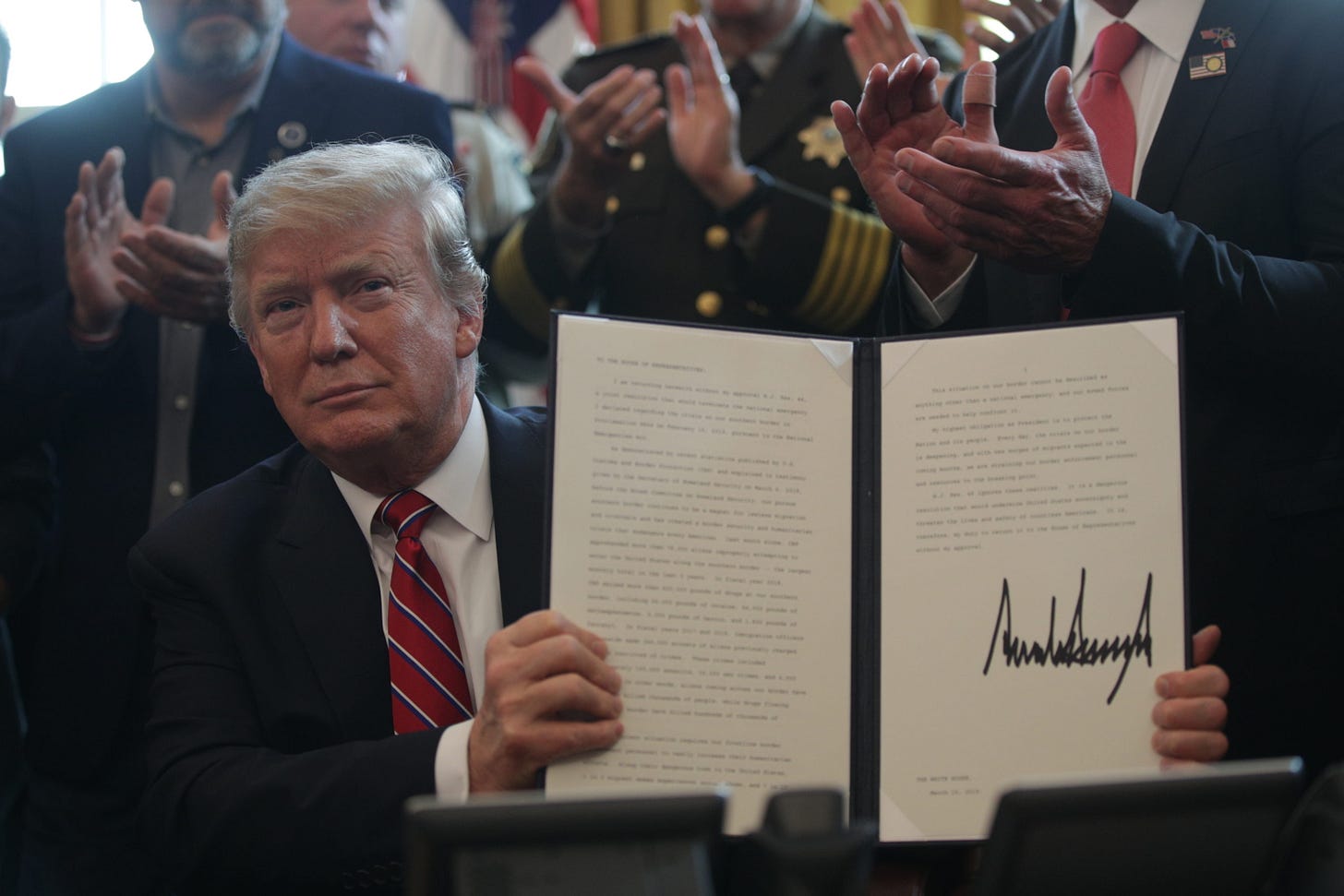Meet the New National Emergency, Same as the Old National Emergency
Neither party seems very interested in stopping the president's power grabs.

Another week brings another squabble between Donald Trump and congressional Republicans on the utility of trade wars. The president’s surprise announcement last week that he would invoke emergency powers to slap a heavy new tariff on Mexico until they “fixed” illegal immigration was bound to generate a certain amount of grousing among the free traders who are still around. There was plenty of that to be heard following Senate Republicans’ Tuesday lunch, with lawmakers complaining that the White House’s representatives had failed to alleviate practically any of their concerns. Sen. Ted Cruz voiced the objections of many when he called the proposal a $30 billion tax hike on Texans, and said “you didn’t hear a single yes” from among the Republicans at the lunch.
Does this mean we are at the cusp of the great revolt, long prophesied, long delayed, of congressional lawmakers over the president’s cockamamie trade ideas? Well, anything’s possible. But scolding rhetoric is one thing, and actually voting to stymie Trump’s agenda is another. For his part, Trump doesn’t seem too worried: “I don’t think they will do that,” he said Tuesday. “I think if they do, it’s foolish.”
What’s remarkable about this moment isn’t just the possibility that Senate Republicans will finally grow a spine on trade. The president’s protectionist fantasies are doing real damage the U.S. economy and threaten to do more. It stands to reason that it will get harder for Republicans to keep looking the other way. What’s more remarkable is the issue most Senate Republicans are studiously not addressing: not just that Trump is planning to spark another trade war, but that he’s planning to invoke emergency powers again to do it.
This raises the question: Are we just over the national emergency question already? Just a few months back, President Trump’s unprecedented decision to ignore Congress’s refusal to pay for his border wall made for a major, monthslong scandal, one that raised critical questions about the imperial presidency and separation of powers and ultimately forced congressional Republicans into some deeply embarrassing votes.
According to CNN, the issue of the national emergency was discussed in the lunch meeting. But it took the form of a question:
At issue is whether the President needs to declare a fresh national emergency to move ahead with the escalating tariffs... If Trump needs to declare a new emergency, it could quickly result in a vote of disapproval that would pass the Democratic-led House and leave Republican senators in a position of having to either vote against Trump or vote in favor of tariffs they disagree with.
The question GOP senators have, in other words, is this: Would this have to be a whole new emergency declaration to suffer through, or could we just lump it in with the one we already took on the chin?
This is a dispiriting development, if not exactly surprising. The whole problem with letting Trump’s national emergency slide through months ago is that it ran the risk of leading us down the path we’re currently on: where abuses of presidential power, so long as they’re committed by Republicans, are first excused, then simply ignored.
When Democrats were last in power, Republicans could at least be counted on to protest this sort of behavior. Unfortunately, the current crop of Democrats hasn’t shown much interest in fixing the problem themselves. House Speaker Nancy Pelosi has in recent months actively pushed back against measures like a solid bill proposed months ago by Senator Mike Lee, which would have dramatically curtailed the president’s national emergency powers by causing national emergency declarations to expire automatically after 30 days unless Congress approved them, and reapproved them on an annual basis thereafter. Pelosi’s excuse for opposing Lee’s bill is that it wasn’t hard enough on Trump, claiming it gave the president “a pass” to “violate the Constitution just this once.”
This was a largely unfair attack on Lee’s bill, which would have treated Trump’s emergency declaration the same way as every other declaration currently on the books. Even if Pelosi’s point were valid, however—well, one constitutional violation is presumably better than two, or three, or however many we’re likely to see over the next few years as Trump gets acclimated to having his hands on his national emergency weapons.
In a certain sense, it’s easy to see the reason behind the strategy: Nancy Pelosi is confident that repeated national emergency crises are electoral disaster for Republicans. Why go out of her way to prevent Donald Trump from kicking his congressional caucus repeatedly in the groin?
This is politics in 2019: As the president grabs more power for himself, he is largely unopposed by either his own party, which lets him rampage out of timidity, or his opponents, who let him rampage out of political greed. Anyone still waiting for a champion of the lawful separation of powers to emerge on the national stage will likely be waiting a while.


